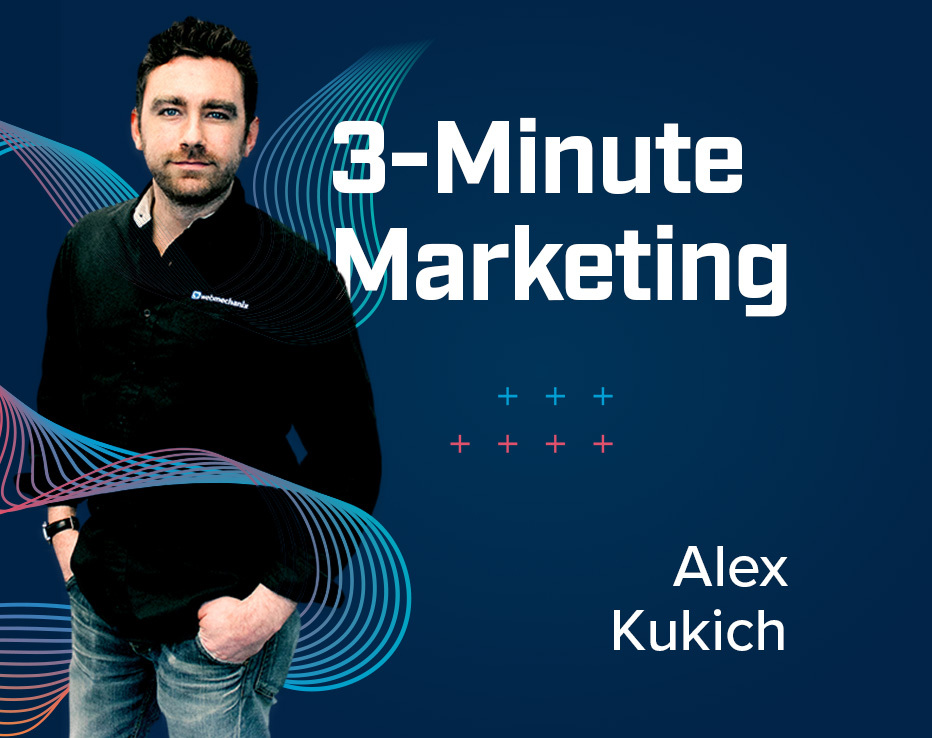
Here’s What Chief Marketing Officers Are Saying about Coronavirus (Roundtable)
Chris Mechanic, co-founder of WebMechanix, recently brought together a dozen Chief Marketing Officers (CMOs) for a virtual round table discussion, spurred by the success of the first event. The meeting was held to share marketing insights related to the COVID-19 pandemic and to stay connected in a time when isolation is the norm. Each professional discussed their company’s situation and the strategies they’re currently pursuing. Here are some of the highlights.
Chris Mechanic
Attention is a valuable commodity in marketing. And there’s plenty of it now that so many people are online and working from home, with few ways to occupy themselves. Traditional advertisers are pulling out and making CPMs drop.
While there’s more attention, people are also reluctant to buy, so you have a lot of pent-up demand from customers who are merely browsing. This will lead to a surge in sales as soon as we get out of quarantine, so you should be proactive and plan for the future.
Organizers of in-person events are hurting or bored. Reach out to them, and you may get good deals or find partnership opportunities. WebMechanix’s clients are seeing more webinar attendees than usual, up from the previous average of 200 to as many as 500. Now’s also a great time to extend the duration of your retargeting lists.
CMO of a revenue consulting firm
They have taken a hit because of COVID-19 due to decreased customer demand. In response, he has pivoted his company’s primary messaging. They’re now focusing on promoting the part of their value proposition that’s still relevant in the context of COVID-19.
The business spoke with many customers during the first week that the news of the virus blew up. Their biggest customers came to them with ideas.
The company also pivoted away from a direct mail campaign because people aren’t at their desks anymore. Instead, they’re trying out account-based marketing and using hyper-targeted ads to show prospects a personalized estimate of how much money they can save.
CMO of a software company
Usually, their product is a nice-to-have, not a need-to-have. They offer an online community, a CMS, and a marketing automation platform for associations and corporations.
With COVID-19, their solutions have become mission-critical since there are now no in-person events for people to attend. The pipeline looks great, but they have a different problem: there are lots of leads, and they can’t follow up with all of them. With that in mind, they need to make sure their sales reps have the right training to follow up with leads efficiently.
Their demos are up 30% year-over-year (YoY) and 90% quarter-over-quarter (QoQ). Before COVID-19, 80% of their budget was for in-person trade shows. But they’ve already begun shifting their budget to digital, so they’re just going to accelerate that shift.
The company was lucky and wants to make the most of this situation. It still has to play things cautiously, though, since its private equity firm wants to freeze non-essential spending.
VP Marketing of a business intelligence platform
The company targets small to midsize software companies. This year was supposed to be their big break, but COVID-19 caught them off guard.
The team was hoping to invest in brand awareness since it’s more of a niche player in this industry. They were also planning to attend more events, including SaaStr for the first time. But because of COVID, they’ve had to cut back on metrics such as brand awareness that they can’t really quantify well, and they can’t attend events in person.
CMO of a SaaS for restaurant management
They’re venture-backed and were planning to raise more funds this year. Unfortunately, the COVID-19 pandemic disrupted these plans, as well as most of the restaurant industry.
He is now cutting back on any non-essential spending and trying to ride out the pandemic frugally. There certainly aren’t as many restaurant-goers, but there are still operational restaurants that, for example, are offering home delivery services. The team wants to find ways to continue to present value through partnerships and other opportunities.
For example, they partnered with a white-labeled rebates company. This partnership lets operators earn cash back from manufacturers and expedites checks to retain customers.
They’ve also applied for grants and are looking into some that are currently being offered by Google and Facebook.
Another CMO chimed in here to mention that some organizations obtain meal donations to deliver to hospitals. That may be a partnership opportunity since it can help with outreach, press, and social media exposure.
CMO of an advisory and accounting firm
The restaurant industry is getting hammered. Their best strategy right now is to reach out and help clients get through this event.
They do 60% of the accounting and tax work for broadway shows in New York, which is another industry that’s now gone silent. However, their other verticals are doing fine.
Things have certainly changed a lot since COVID-19, and they had to shift their messaging and strategy within a week. Luckily, the company is a tech-forward company, so its employees are already prepared to work from home. Their website traffic is up three times YoY because of all the resources and communication they have in place.
They have scaled back on its investments and postponed its events until autumn of 2020, which may end up being a busy season. They also paused a billboard and metro advertising campaign and went digital. Webinar and marketing automation tools have also allowed them to partner with local chambers of commerce to reach new audiences in ways they would never have before.
Digital will become crowded thanks to COVID, so having solid SEO strategies in place will be critical to remaining competitive. Her theory is that there will be tons of “push” strategy, but the “pull” strategy (inbound marketing) will be the most important.
She is considering holding “industry pulse check” virtual meetings with her clients. When she sent out the idea to gauge demand, some industries weren’t interested, while others, like those in the restaurant industry, were.
CMO of a management consulting and wealth management firm
To deal with COVID-19, the firm built an internal task force and completely pivoted, hosting more virtual events and revisiting its messaging to build a stronger digital brand. He believes this crisis will test how much your customers trust you, which is what great brands ultimately rely on to get through difficult periods.
The COO of a healthcare analytics platform
The company has seen a decline in interest among its hospital clients, who can’t afford new solutions with their current budgets and other priorities.
The business is focusing more on SEO for now and engaging in more promotional and traffic exchange partnerships with publications and associations by sharing content. They’ve also been publishing lots of informational posts, including ones related to COVID and its impact.
Finally, he has paused its paid advertising for webinars and is investing more time and effort into its email marketing campaigns.
VP of Global Growth of a demand generation, field marketing, sales development, and forecasting firm
He believes that there’s no single way to deal with this crisis and that it’s all contextual. Ask yourself this key question: Who is leading your digital strategy? Is it your CEO? Your CMO? Or is it COVID? His advice? Don’t let it be COVID.
He also predicts that digital marketing will be important for everyone during this time, so overall ad costs will go up in the long run.
CMO of a business that enables in-store retailers to offer a digital experience
Unfortunately, their primary customer base consists of brick and mortar stores, most of which have been hit hard by COVID-19.
He plans to spend a lot of time educating executives about the importance of marketing during times of crisis. He shared a post on three idiotic marketing moves that are currently being taken, where it’s discussed that there’s immense pressure right now to believe that marketing is a dead end during COVID-19. This couldn’t be farther from the truth, though. Instead, you should defend what marketing can do for your company and find opportunities to pursue. This time will pass.
While the current and next quarter will be tough, you should look beyond the short term and ask yourself where you’ll be 12 months from now. The business isn’t repositioning. Instead, they’re relying on the fact that fear is a great motivator for information-seeking. With this in mind, the company plans to present itself as a trusted advisor to help prospects and customers navigate the current situation and future outlook.
It also reached out to every CEO of every company in its account list; those CEOs are responding in droves. This reveals an interesting observation: Spurred by the uncertainty around COVID, many of these companies, including Hugo Boss, want to collaborate. And they wonder why it took a global pandemic to do these sensible things.
Marketing Director of a creative and staffing company for mid-sized to enterprise companies
Many companies have announced hiring freezes in response to COVID-19; naturally, this has dealt a blow to their business. But there are still opportunities to be seized. For instance, the hospitality industry has had to lay off many employees, so they’re now trying to position themselves as a resource to help these people find jobs.
About a third of CMOs and CTOs are increasing their advertising spend. Another third will maintain what they’re doing while prioritizing digital marketing, and the final third are cutting their spending.
The company is scaling back its advertising budget and using every marketing tool at its disposal. For example, they’ve found that text messages are now surprisingly effective, and they’ve gotten a 15% response rate through their text message marketing campaign.
Chris plans to hold many more of these virtual roundtables in the future. Follow our blog to keep up with the latest in marketing.
Most newsletters suck...
So while we technically have to call this a daily newsletter so people know what it is, it's anything but.
You won't find any 'industry standards' or 'guru best practices' here - only the real stuff that actually moves the needle.






